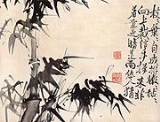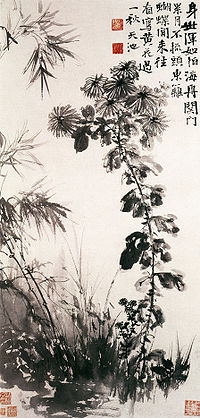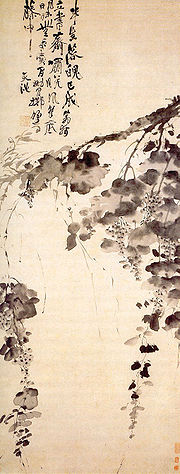
Xu Wei
Encyclopedia

Ming Dynasty
The Ming Dynasty, also Empire of the Great Ming, was the ruling dynasty of China from 1368 to 1644, following the collapse of the Mongol-led Yuan Dynasty. The Ming, "one of the greatest eras of orderly government and social stability in human history", was the last dynasty in China ruled by ethnic...
Chinese painter, poet and dramatist famed for his artistic expressiveness. Revolutionary for its time, his painting style influenced and inspired countless subsequent painters, such as Bada Shanren, the Eight Eccentrics of Yangzhou
Eight Eccentrics of Yangzhou
Eight Eccentrics of Yangzhou is the name for a group of eight Chinese painters known in the Qing for rejecting the orthodox ideas about painting in favor of a style deemed expressive and individualist....
, and the modern masters Wu Changshuo
Wu Changshuo
Wú Chāngshuò is the name for which Wu Junqing is best known. He was born in Zhejiang from a scholarly family and for a time toward the end of the Qing he served as an official in Liaoning. He settled in Suzhou in his twenties.Initially, he devoted himself to poetry and calligraphy with a strong...
and Qi Baishi
Qi Baishi
Qi Baishi was an influential Chinese painter.Born to a peasant family from Xiangtan, Hunan, Qi became a carpenter at 14, and learned to paint by himself. After he turned 40, he traveled, visiting various scenic spots in China...
. Qi once exclaimed in a poem that "How I wish to be born 300 years earlier so I could grind ink and prepare paper for Green Vine ( A Xu Wei pen name)" (恨不生三百年前,為青藤磨墨理紙). Xu Wei can be considered as the founder of modern painting in China. His influence continues to exert itself. Despite his posthumous recognition, Xu was manifestly mentally ill and unsuccessful in life, ending his life in poverty after the murder of his third wife and several attempts at suicide.
His style names were Wenqing (文清)and then later Wenchang (文長). His pseudonyms were The Mountain-man of the Heavenly Pond (天池山人 Tiānchí Shānrén), Daoist of the Green Vine House (青藤道士 Qīngténg Dàoshì) and The Water and Moon of the Bureau's Farm (署田水月 Shǔtián Shuǐ Yuè). Born in Shanyin (山阴 - now Shaoxing
Shaoxing
Shaoxing is a prefecture-level city in northeastern Zhejiang province, People's Republic of China. Located on the south bank of the Qiantang River estuary, it borders Ningbo to the east, Taizhou to the southeast, Jinhua to the southwest, and Hangzhou to the west. It was once known as "越"...
in Zhejiang Province), Xu was raised by a single mother who died when he was 14. At 21, he married Pan-shi (潘氏), who died five years later. Though he passed the county civil examination at age 20, Xu was never able to pass the provincial civil service examinations, even after attempting it eight times. Nevertheless, Xu was employed by General Hu Zongxian (胡宗憲), Supreme Commander of the Jiangsu-Zhejiang-Fujian coastal defense against the wokou (倭寇) Japanese pirates.

Bipolar disorder
Bipolar disorder or bipolar affective disorder, historically known as manic–depressive disorder, is a psychiatric diagnosis that describes a category of mood disorders defined by the presence of one or more episodes of abnormally elevated energy levels, cognition, and mood with or without one or...
, a condition actually recognized in China at this time. Xu spent the rest of his life painting, but with little financial success. However, his paintings have been highly sought after in modern times.
In addition Xu was a relatively unknown playwright
Playwright
A playwright, also called a dramatist, is a person who writes plays.The term is not a variant spelling of "playwrite", but something quite distinct: the word wright is an archaic English term for a craftsman or builder...
, authoring the following four plays: The Heroine Mulan Goes to War in Her Father's Place (雌木蘭 Ci Mulan): describes Hua Mulan
Hua Mulan
Hua Mulan is a legendary figure from ancient China who was originally described in a Chinese poem known as the Ballad of Mulan . In the poem, Hua Mulan takes her aged father's place in the army. She fought for 12 years and gained high merit, but she refused any reward and retired to her hometown...
, A Female Degree Holder (女狀元 Nüzhuangyuan): The Adventures of the Intelligent Huang Chongjia (黃崇嘏), The History of the Mad Drum (狂鼓史 Kuanggu Shi): crimes of Cao Cao
Cao Cao
Cao Cao was a warlord and the penultimate chancellor of the Eastern Han Dynasty who rose to great power during the dynasty's final years. As one of the central figures of the Three Kingdoms period, he laid the foundations for what was to become the state of Cao Wei and was posthumously titled...
, and A Zen Master's Dream of the Land of Green Jade (翠鄉夢 Cuixiang Meng): a Buddhist story. Interestingly, Xu's dramatic efforts often deal with women's themes and Xu can be regarded as something of an early women's rights advocate.
Xu Wei was also a poet in shi style of considerable note. Xu's collected works in 30 chapters exists with a commentary by the late Ming writer Yuan Hongdao
Yuan Hongdao
Yuan Hongdao was Chinese poet of the Ming Dynasty, and one of the Three Yuan Brothers. His life spanned nearly the whole of the Wanli period in Chinese history. Yuan was from Gong'an in Hukuang. His family had been military officials for generations. Yuan showed an interest in literature from...
. Yuan Hongdao and the others of his literary movement were undoubtedly influenced by the writings of Xu. Of the various arts Xu Wei practised, he held his calligraphy in highest esteem. Next was his poetry.
A modern typeset edition of Xu Wei's collected works, Xu Wei ji, was published by the Zhonghua Publishing House in Beijing in 1983. Previously a 17th century edition of his collected works known as the Xu Wenchang sanji was reproduced in Taiwan in 1968. In 1990 a book length study of Xu Wei by Xu Wei can be seen as the quintessential “scholar in cotton clothes” or buyi wenren, a scholar who could not pass the civil service examination, yet became active in the realm of literature and cultural achievement. Many such individuals appeared in the late 16th and early 17th centuries and attached themselves to successful officials or became independent in late Ming China.

External Links
- Xu Wei's Calligraphy and Painting Gallery at China Online Museum

